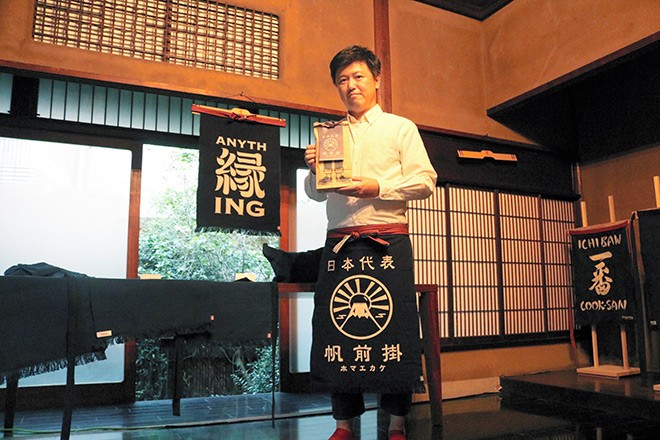By ETSUKO AKUZAWA/ Staff Writer
November 17, 2021 at 07:10 JST
Patience has paid off for two Tokyo-based shops, with an assist from the world’s most famous spy.
Morita Tatami Mat Maker in Arakawa Ward and apron-producer Anything Co. in Minato Ward started their efforts to enter overseas markets several years ago.
This year, the companies have been flooded with orders from abroad and at home since their traditional products appeared in the latest 007 movie, “No Time to Die.”
At the climax of the movie, James Bond (Daniel Craig) confronts the villain, Safin (Rami Malek), in a room whose floor is covered with straw tatami mats.
Safin is an ardent admirer of Japanese culture, and a Noh mask and a “karesansui” rock garden are also featured in the spy flick.
The mats came from Morita Tatami, which was founded in 1933 and is managed by a three-member team: Takashi Morita, 57, his father and an artisan.
Worried about declining domestic demand for tatami, Morita added an English order form to the store’s website to enhance export opportunities in 2007.
In 2018, he received an order for 300 tatami mats to line a runway for a Paris Fashion Week venue.

For “No Time to Die,” the shop made 112 mats, each measuring 180 centimeters long, 90 cm wide and 3 cm thick, in 10 days and delivered them through a furniture shop in London.
“There was ‘007’ at the end of the subject line of an email, but I thought it was a reference number,” said Morita, a long-time fan of the spy series.
The furniture shop informed Morita that the tatami mats would be used in the next James Bond movie.
Morita initially recommended Japanese “washi” paper twisted into yarn for the surface of the mats to make them resistant to color loss and water-repellent. But the client was adamant about using natural grass for the surface of the tatami.
After “No Time to Die” was released in Japan on Oct. 1, Morita received orders from customers around Japan, including Ibaraki and Gifu prefectures, who said they wanted the same tatami used for the film.
“I’d be happy if the reputation from foreign customers leads to the re-evaluation of tatami,” Morita said.
The movie also has a scene of Q (Ben Whishaw), an agent of British secret intelligence agency MI6 who provides Bond with gadgets, wearing a “maekake” apron while cooking in his home.
Made of sailcloth, the navy blue apron features Mount Fuji, a rising sun and “Representative of Japan” in white.
The apron was made by Anything.
In 2005, the company’s president, Kazuhiro Nishimura, now 48, was fascinated by the traditional apron when he visited Toyohashi, Aichi Prefecture, where sailcloth maekake are still produced.
He learned cotton weaving techniques handed down in the Mikawa region and improved the quality of dyes to begin full-scale sales in 2006.
In 2011, a buyer from a daily goods shop in London became fond of sailcloth maekake while visiting Japan.
Since then, Anything has been selling 500 pieces in Britain annually.

One of them caught the attention of a wardrobe staff member for the James Bond movie.
Through the daily goods shop, Nishimura then received an offer to use maekake in the film.
In the two weeks after the movie was released, Anything received orders for 200 pieces from home and abroad, with many of the customers saying they wanted the same apron as Q.
The company has set up booths at trade fairs outside Japan since 2009 to promote sailcloth maekake. But it didn’t sell when too much emphasis was placed on “Japaneseness.”
In 2015, Nishimura switched the booth to a simple sales section lined with aprons displayed with only a “Maekake” sign.
He also shows visitors how to tie the apron at the hips.
Currently, 30 percent of the company’s sales total comes from overseas.
“The world view of 007, which values the spirit of Japanese traditional aesthetics of ‘wabi-sabi’ and stylishness, is similar to what we aim to achieve,” the president said.




















A peek through the music industry’s curtain at the producers who harnessed social media to help their idols go global.
A series based on diplomatic documents declassified by Japan’s Foreign Ministry
Here is a collection of first-hand accounts by “hibakusha” atomic bomb survivors.
Cooking experts, chefs and others involved in the field of food introduce their special recipes intertwined with their paths in life.
A series about Japanese-Americans and their memories of World War II